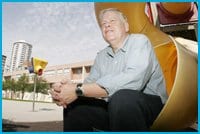This fall the fight for queer rights is shifting from Parliament and courts to Canadian classrooms.
Lobby groups and progressive school board trustees are setting their sights on bullying – and what needs to be done to stop it.
In the first public initiative from its education committee, queer lobby group Egale Canada has launched a safe-schools petition campaign, calling on federal and provincial education ministers to “provide a safe, caring and inclusive school environment” for queer students and teachers, as well as kids of queer parents or kids perceived as being queer.
Laurie Arron, Egale’s director of advocacy, says that, after the marriage fight, schools are the next natural step for queer activism.
“Opponents [of same-sex marriage] would say, ‘Next thing you’re going to want to be teaching kids about equal marriage in school, or that being gay is okay,’ and I would reply ‘Absolutely.’
“For us, we just want visibility and safety. We want kids to be who they are, to see themselves and their families reflected in the curriculum and to feel safe at school.”
The petition, launched in August in recognition of the United Nation’s International Youth Day, has already garnered thousands of signatures through circulation at Pride events.
Egale’s education committee, composed mainly of teachers and education researchers, was formed last fall to determine what role Egale should play in making schools safer for youth, teachers and parents.
“The petitions are a tool to engage provincial ministers of education and to engage communities. It is an awareness campaign more than anything,” says Arron. “The safe schools petition campaign is really just dipping our toe in the water at this point – a very early start.”
Egale is also involved in the Canadian Anti-Violence Project (CAVP), launched in March 2005 with partners Fondation Émergence, the Canadian Rainbow Health Coalition and other community organizations to “coordinate action to end homophobic and transphobic violence.” Its agenda is broader than the domain of schools and youth: how to respond to any violence directed toward queer people.
Because bullying and anti-discrimination policies are usually made by individual school boards across Canada and because implementation is often inconsistent, it can be difficult to get a good picture of the state of bullying, antigay and otherwise, in Canada. For example, a recent University Of Calgary study found that “within the total school population it’s estimated that 10 percent are the bullies, anywhere between 10 and 50 per cent are the victims, and the rest are bystand-ers.” It’s also difficult to figure out how each school handles it.
“There is such a huge disparity in situations across the country,” says Arron. “You have the Toronto District School Board (TDSB) which is generally pretty good in terms of policies, curriculum and substantive awareness that if a kid is being bullied that school will do something about it.”
TDSB trustee Chris Bolton, who thinks Egale’s petition is a good idea, is concerned that the board isn’t doing enough to ensure the implementation of their equity policies, resulting in students still being bullied and harassed.
Sometimes there is a dis-connect between intention and effect. Bolton says the Safe Schools policy used by the TDSB, based on Ontario’s Safe Schools Act which took effect September 2001, often ends up victimizing the marginalized students it was designed to protect.
That act makes suspensions mandatory for behaviour including bullying, intimidating or threatening (three-day suspension), sexual or racial harassment (three-day suspension) and hate-motivated violence (10-day suspension). The latter category includes sexual orientation and also allows for a possible expulsion and mandates that police will be called.
But the emphasis is on penalties and Bolton would like to see more preventative activities in place, and the restoration of youth workers and other support staff to schools.
“It’s not just about safe-schools policy,” says Bolton. “It’s also about ensuring we have an inclusive, supportive environment that ensures all the kids are engaged and that all kids are having an education that is relevant to them.
“The Triangle Program [an alternative school program in Toronto for queer students who are having a difficult time in the mainstream system], for instance, lost its youth counsellor. Those kinds of people allow kids another sort of opportunity to be part of the school system and to not feel like they’re marginalized.”

 Why you can trust Xtra
Why you can trust Xtra


